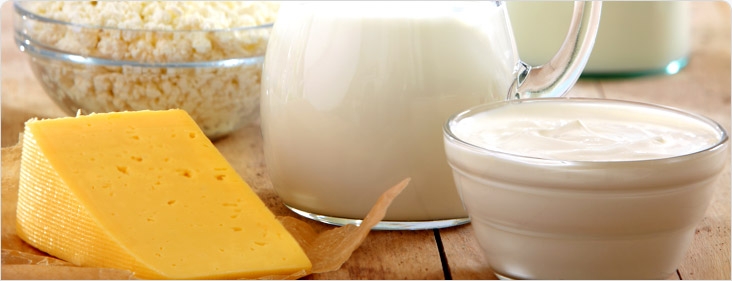
All About Milk, Yogurt, and Cheese
Dairy products are your body's best source of calcium. They're also good sources of protein and carbohydrates
WHY WE NEED DAIRY
Foods from the milk group are good sources of vitamins A and D, both important for your skin, bones, and teeth. Unfortunately, most Americans do not drink enough milk and eat milk products every day.
Milk and milk products are the best sources of calcium, which is necessary to build strong bones. If your body does not have enough calcium, your bones can get weaker. Calcium is also important to make blood, nerves, and muscles work properly. Postmenopausal women are at special risk for not having enough calcium.
Milk, yogurt, and cheese are also good sources of protein and carbohydrates. Cheese has a lot of protein. Milk and yogurt provide more carbohydrates than protein per serving.
Milk and milk products can help you lose weight. People who eat a low-calorie diet with more milk products were shown to lose more weight than people who do not.
HOW MUCH MILK DO I NEED?
Adults are recommended to have 3 cups a day of milk or milk products. One cup of milk is equal to:
- 8 oz of yogurt
- 1½ oz of cheese like cheddar or mozzarella
- 2 oz of processed cheese (about 3 slices)
Milk-based desserts, like ice cream and puddings, also count towards the milk group. For example, 1½ cups of ice cream (about 3 scoops) count as one cup of milk.
Servings of milk are not the same as the serving sizes listed in the Nutrition Facts: 8 oz of yogurt is one serving of milk; but most single-serving yogurts are only 6 oz (3/4 cup)
WHAT CAN I DO IF I CAN'T DRINK MILK?
It’s important to get enough calcium in your diet. If you are lactose intolerant, you can try lactose-free alternatives or take lactase enzyme products.
If you are a vegan or do not eat or drink milk products for other reasons, soy products can be a good source of calcium. Juices, cereals, and rice or almond drinks with added calcium can also be helpful.
WATCH OUT FOR FAT AND CALORIES IN THE MILK GROUP
Most products from the milk group come from animal sources. Because of this, milk and milk products can have a lot of fat, cholesterol, and calories.
The fat content and calories in each serving of dairy can vary greatly. Let’s look at 3 foods that offer one serving of dairy:
- One cup of skim milk (8 fluid ounces) has 86 total calories and less than one gram of fat
- One cup of whole milk has 150 calories and 8 grams of fat
- 1½ cups of ice cream has at least 400 to 600 calories. Half of these calories may be from fat. Plus, ice cream has a lot of added sugar
Skim milk can get you the same nutrients with way fewer calories and fat than whole milk. And it’s probably a far better choice than ice cream to get your calcium!
As you see here, you can have all of the benefits of the milk group with less fat. The recommended way to get your servings of dairy is with fat-free or low-fat milk, cheeses, and yogurt. A small amount of ice cream can be a reasonable dessert, but it’s probably not a good way to meet your dairy needs!
WHAT ARE PROBIOTICS IN DAIRY?
Probiotics are "good" bacteria. They are sometimes added to yogurts and other dairy products. Probiotics can help regulate the bowels.
